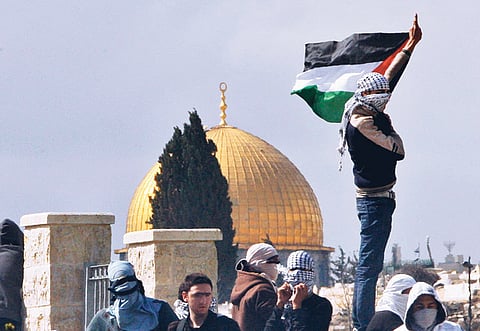Palestinian uproar a cry for help
Arabs in occupied Jerusalem have been forced to react to Israeli pressures

Dubai: They are trapped in a battlefield and are steadfast in their fight against Israeli measures.
However, they need support to continue fighting for survival.
Yesterday Israel reopened the flashpoint Al Aqsa mosque compound and lifted a day-old lockdown of the occupied West Bank, a day after occupied Jerusalem saw the heaviest Palestinian rioting in years. However, many are worried that the situation will soon boil over.
"Arab Palestinians in occupied East Jerusalem can't liberate the city, but they can hold in the face of the Israeli measures. They need support," Secretary-General of the Jordanian Royal Committee for Jerusalem Affairs, Abdullah Kan'an said.
"Arabs, Muslims and all peace advocates should take the initiative and defend [occupied] East Jerusalem and support its Arab populations by all means, support Jerusalemites financially and morally, support their housing projects, their schools and clinics," Kan'an told Gulf News in an interview.
Many experts share Kan'an's desire to maintain the Arab and Muslim identity of the city, which was occupied by Israel from Jordan in the 1967 Arab-Israeli war. The city is facing an "accelerated" Israeli effort to "Judaise" it, researchers warn.
Identity cards
Apart from making their regulations more strict, Israeli authorities are working on changing Arabic names to Hebrew ones, confiscating Arab properties to expand existing colonies or constructing new ones, confiscating Arab identity cards and imposing higher taxes on Arabs in the city.
The number of Arabs in occupied East Jerusalem is around 300,000 compared with 200,000 Jews.
The city became the focus of the world's attention with the recent Israeli-American political turmoil over Tel Aviv's colony construction, and Tuesday's violent clashes between Palestinian stone-throwers in the face of armed Israeli soldiers after the rededication of a synagogue in the walled Old City in occupied East Jerusalem.
The synagogue was first built in 1694 and destroyed 21 years later by Ottoman authorities who held power at the time. The site was empty for many years, and was named "Hurva", which means ruin in Hebrew. The ruins were blown to pieces in the 1948 Arab-Israeli war.
However, many Palestinians and Arabs fear that the reopening of the synagogue, which is only a few hundreds metres away from the Haram Al Sharif Compound, is part of the an Israeli plan to demolish the Al Aqsa mosque and rebuild a Jewish temple on its ruins. The compound is the third holiest site for Muslims.
Meanwhile, the fate of occupied East Jerusalem was put on the schedule of stalled final status talks between Palestinians and Israelis. Until then, the control over the Islamic sites in occupied East Jerusalem was given to Jordan, according to the peace treaty signed in 1994.
"Israel respects the special role of the Hashemite Kingdom of Jordan in Muslim Holy Shrines in [occupied] Jerusalem. When negotiations on the permanent status will take place, Israel will give high priority to the Jordanian historic role in these shrines," the peace treaty stipulates.
Currently, Kan'an said, Jordan's Ministry of Awqaf and Islamic Affairs has nearly 600 employees in occupied Jerusalem.
They also hold the keys for the gates of the Old City. However, Israeli troops are deployed near each of the seven gates, and have the final say in closing and opening them, he added.
As for the churches, each is under the control of each denomination, Kan'an added. "[Occupied] Jerusalem is a red line," the Jordanian official said.
"Which means, there will be no peace with Israel, no peace treaties with Israel until [occupied] East Jerusalem is made capital of the future Palestinian independent state and Israel withdraws its forces from all occupied Arab territories."
Sign up for the Daily Briefing
Get the latest news and updates straight to your inbox


